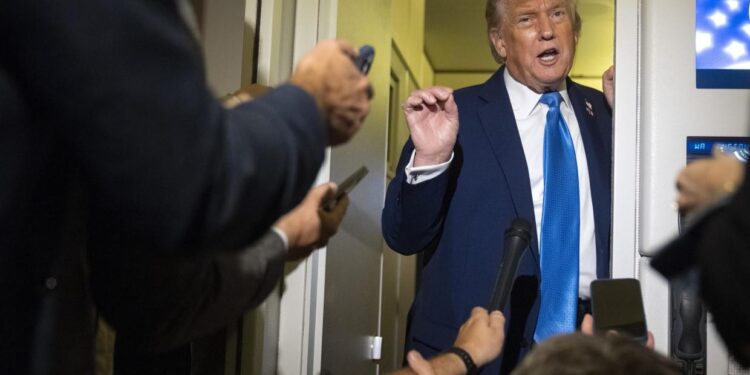Trump Declines Putin’s Offer to Mediate Israel-Iran Conflict, Urges Russia to Address Domestic Issues First
In a notable diplomatic rebuff, former U.S. President Donald Trump has dismissed Russian President Vladimir Putin’s proposal to act as a mediator between Israel and Iran. Speaking in a recent interview, Trump insisted that Moscow should concentrate on resolving its internal challenges before intervening in complex foreign disputes. This exchange underscores the intricate geopolitical tensions in the Middle East and highlights the evolving dynamics between Washington and Moscow amid rising regional instability.
Trump’s Rejection: Prioritizing Russia’s Internal Affairs Over Middle East Mediation
Responding directly to Putin’s suggestion of brokering peace talks between two of the region’s most contentious nations, Trump expressed skepticism about Russia’s motives. He argued that before engaging in international mediation efforts, Russia must first tackle pressing issues at home—most notably its ongoing military conflict in Ukraine and domestic political unrest.
This stance reflects Trump’s broader approach toward foreign policy: emphasizing American interests while remaining wary of ceding influence to rival powers like Russia. Key themes from his remarks include:
- Ensuring Regional Security: Trump stressed that sustainable peace in the Middle East cannot be achieved through Russian intervention alone.
- Support for Israel: He reaffirmed unwavering backing for Israel as a vital ally confronting Iranian hostility.
- Caution Toward Russian Intentions: Critics argue Putin’s offer is less about genuine peacemaking and more about expanding Moscow’s strategic foothold across the region.
The Broader Impact on U.S.-Russia Relations and Middle Eastern Power Balance
The firm dismissal by Trump signals potential shifts within U.S.-Russia diplomatic relations at a time when both countries are vying for influence across global hotspots. By sidelining Moscow’s mediation bid, Trump’s position may further complicate cooperation on critical issues such as defense collaboration, trade negotiations, and regional security arrangements.
This development raises several pivotal questions regarding future engagement strategies:
- Will America maintain its leadership role in facilitating peace talks?
- How might Russia leverage this rejection to deepen ties with Iran or Syria?
- Might Iran or Israel pursue independent strategies absent American involvement?
Moscow could interpret this refusal as an opportunity to assert itself more prominently as a power broker within the Middle East—especially given unresolved conflicts like Syria’s civil war and Tehran’s expanding regional ambitions. Such moves risk altering alliances and escalating tensions if key actors perceive Washington stepping back from traditional responsibilities.
| Nation | Recent Diplomatic Actions | Status of Influence |
|---|---|---|
| United States | Sustained support for Israel; sanctions targeting Iran’s nuclear program; | Diminishing presence amid shifting priorities; |
| Russia | Mediating Syrian ceasefires; bolstering Iranian partnerships; | Evolving into stronger regional influencer; |
| Iran | Pursuing negotiations with Moscow; supporting proxy groups; | Broadening reach throughout Levant; |
| Israel | Sustaining defense cooperation with U.S.; countering Iranian threats; | Largely stable but vigilant; |
A Strategic Reassessment: Why Russia Should Focus Inward Before Mediating Abroad
The outright refusal by former President Trump invites reflection on whether Russia is currently positioned effectively to serve as an impartial mediator between Israel and Iran. Given ongoing conflicts within its own borders—and neighboring regions—Moscow faces significant hurdles that could undermine any external diplomatic initiatives it undertakes.
- Cultivating International Trust: Successful conflict resolution domestically would enhance Russia’s credibility on the world stage.
- Pursuing Regional Stability First: Addressing internal disputes may create conditions conducive for meaningful engagement elsewhere later on.
- < strong > Strengthening Alliances : Collaborative efforts with key stakeholders could improve prospects for comprehensive peacebuilding measures .
Conflict Current Status Potential Role For Mediation
/ tr >
/thead >
/ tr >< td > Syria / td >< td > Complex multi-faction war persists . / td >< td > Broker agreements among warring parties . / td >
/ tr >< td > South Caucasus / td >< td > Tense but manageable situation . / td/tbody >
/table >The Road Ahead: Navigating Geopolitical Uncertainties Amid Heightened Tensions
The rejection of Putin’s mediation offer by Donald Trump encapsulates broader challenges facing international diplomacy today—where competing national interests often overshadow collaborative problem-solving efforts. As both Washington and Moscow juggle their respective strategic priorities amidst volatile circumstances worldwide—including renewed clashes along various fault lines—the prospect of achieving durable peace remains uncertain at best.
This episode also serves as a reminder that effective mediation requires not only willingness but also legitimacy rooted in demonstrated capacity at home—a standard which critics argue Russia has yet fully met given ongoing crises such as those seen recently across Eastern Europe.
Final Thoughts
The firm stance taken by former President Donald Trump against Vladimir Putin’s proposal spotlights enduring complexities shaping global politics today—particularly concerning U.S.-Russia relations intertwined with Middle Eastern affairs. This decision reflects deep-rooted skepticism over Russian intentions while underscoring America’s commitment toward allies like Israel amid growing threats from Iran-backed factions.
The unfolding scenario demands close observation since these diplomatic choices will likely reverberate far beyond immediate participants — influencing global power balances well into the future.














